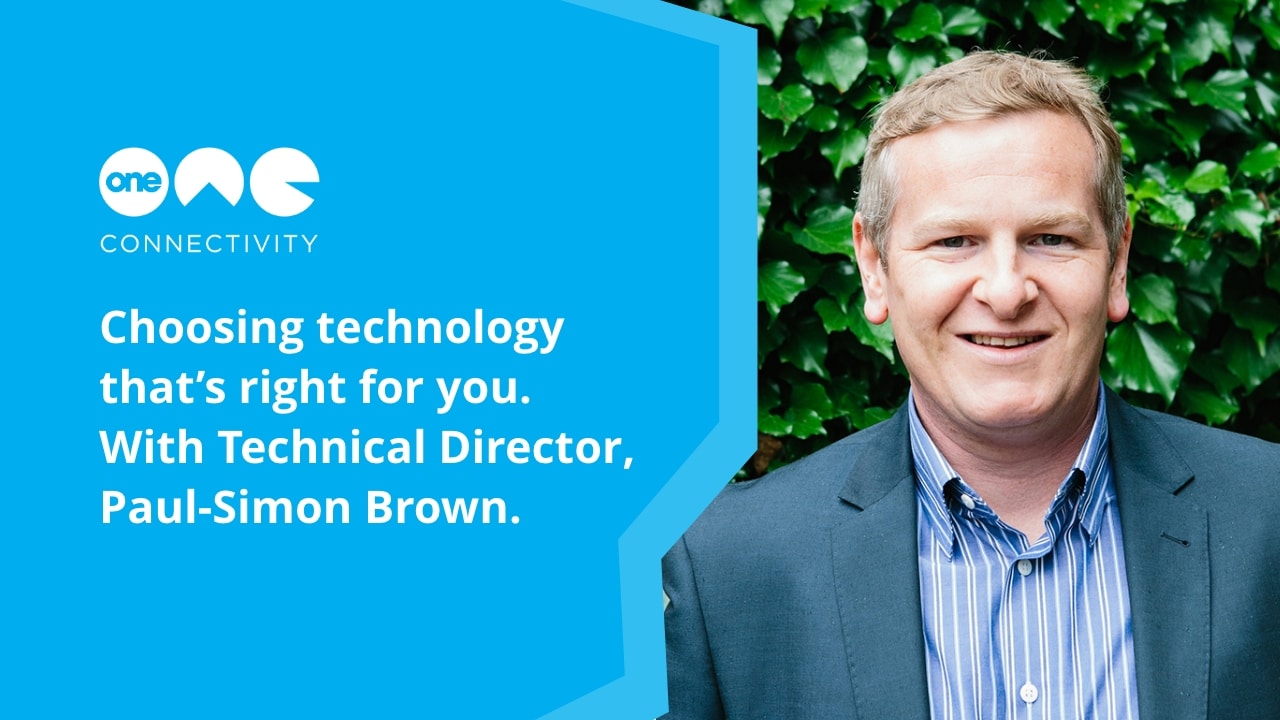
23 Jun How to choose technology that works for you
Choosing technology is huge for any business. Get it right and you’ll be more productive. Get it wrong and you’ll be saddled with something that’s all cost and no benefit. And on top of all that, you’ll eventually have to spend all over again replacing it.
I’ve spent years now helping businesses make those decisions, and figured now was a good time to share some advice.
At One Connectivity, we provide telecoms and connectivity to other businesses. Since communications technology is my wheelhouse, that’ll be my main focus here. But honestly, these principles apply to just about any tech.

The basics
I’ll start with something you might not expect to hear from a tech company…
Technology isn’t everything. Obviously it’s important and extremely useful. But my point is this – your culture and structure are what makes your business what it is. Technology is there to help you along.
A well-run business with basic tech will do better than a poorly run business with the best tech. The key is first to establish good practices, and then seek tech that will support them and make them more effective.
Technology should be a servant, not a master – it’s all about finding something that serves your needs. Next I’ll look at how to go about it.
What are your needs now?
This may seem obvious, but it’s easy to end up skipping this step and overspending on fancy features you don’t really need. The first thing to do is to look at your existing processes and ask whether the tech will improve them. Ideally it should add value by making what you already do more efficient.
Let’s say you’re looking for business broadband. The most high-spec option currently is installing a leased line, which deliver incredible upload and download speeds. But (unsurprisingly) it’s also the most expensive broadband option. You can still get very fast speeds with other options, like FTTP.
So what to do? The answer is to look at your usage, your budget and whether an upgrade will actually add value by speeding you up. Then you can make a more informed decision.
Will your needs change?
This is a follow-on from the previous point. Especially with bigger investments, you need to take your longer-term plans into account. For instance, if you have plans to expand to new locations, the last thing you want is to have to start from scratch technologically when you move.
Phone systems are a great example. One of the big distinctions there is between cloud-based and on-premise systems. With on-premise, you’re tied to a physical piece of hardware. With cloud, you just license as many users as you need.
Each system has its pros and cons, but cloud is much more flexible and scalable. So, back to that example. If you’re currently based in one site and plan to expand to more, cloud technology might be much more convenient. Instead of installing something completely new, you’d simply add licences for people at the new site.
Is it futureproof?
My previous point is about potential changes to your business. This is more about potential changes to the technology itself. Technology can become obsolete for all sorts of reasons. It could be a change in the law. It could be that it’s replaced by something superior, like VHS was by DVD.
We have an example of this in telecoms in the UK right now. BT are retiring all IDSN and PSTN landlines. They’re doing this nationwide, and by 2027, there will be none left. It means all calls will be made and received over the internet. In turn, this means there’s little point in investing heavily in technology that relies on the old infrastructure.
With a cloud phone system, on the other hand, your calls are already routed online. This means it’s useful now, and will still be useful in 2026! It’s important to be aware of these sorts of things before you make a decision.
Pick your provider with care
When you look at all these considerations, it can be genuinely tricky if it’s a technology you don’t know much about. That’s why the provider is so important. Two factors stick out here: expertise and trust.
Unfortunately, a lot of businesses would rather chase quick sales than add value for their customers. In fact, the whole reason we set up One Connectivity was to offer an alternative to that. I hope it doesn’t seem too “salesy” to use us as an example, but it’s true!
We based our business model on two basic things. We know our stuff about telecoms, and we want to do right by our customers. That means we don’t just upsell for the sake of it – we listen to what they need, and apply the principles I’ve talked about here.
Of course, whatever the tech, you can’t be 100% sure that a provider will be right for you. That’s why it’s always good to ask around and check out online reviews.
Final thought
The right technology can transform a business, but it’s crucial to take the right steps when you decide what to invest in. I hope this helps you do that!
